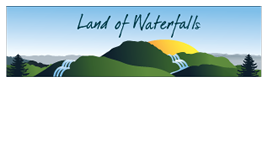
Note: This article is part of a series on street namesakes in Brevard.
When the city of Brevard was founded in 1861, many of the earliest organizers had streets named for them in honor of their contributions to the town. The next founder to be highlighted in this series is Oliver Cromwell Morgan, the namesake for Morgan Street which runs mostly parallel to Main Street, terminating at each end at Johnson Street and Oaklawn Avenue. Although one source suggests that the street was named for Oliver’s oldest son, pharmacist J. Houston Morgan, all other sources indicate that Oliver is the street namesake.
Oliver Cromwell Morgan was born on January 20, 1833 to Squire James Morgan (1799-1865) and Sarah Bayne Morgan (1804-1887) in what is now the Cherryfield area of Transylvania County. Oliver was the fourth of eight children. Prior to this Oliver’s parents lived in the Kanuga area of Henderson County and had extensive land holdings: 92 acres on the Pacelot River, 234 acres in the Mud Creek area and 100 acres in the Green River area.
Oliver married Martha Ward (1832-1888) in Wilkes, NC on November 30, 1854. The couple had three children, all sons: James Houston (1855-1897), William R. (1860-1903), and Oliver Cromwell Jr. (1866-1890).
When the Civil War began Oliver enlisted as an officer (sergeant) on July 15, 1862 and served as a blacksmith in Company D, 7th Battalion until being transferred to Company C, 65th Regiment. Initially he was reported for deserting from Rutherfordton, NC in February 1864, but it was later reported that he was captured and held at Kinston (likely Tennessee) and his date of release was not given. It seems most likely that he was indeed a prisoner and not a deserter during that time, as evidenced by printed letterhead found in the papers of Oliver Morgan after his death indicating that he was tracking the activities of the Indiana Volunteer Battery Camp, 8th Regiment in 1863. Records from that unit confirm that enemy troops were in the area at the time of Oliver’s service in many of the places near where he was confirmed captured.
After the end of the Civil War Census records show Oliver’s profession as “farmer” in 1870 which then shifts to “blacksmith” in the 1880 Census. The listing as farmer doesn’t necessarily mean he was doing farm work as his main occupation. It likely means that his main employment was managing large landholdings rather than engaging in physical labor, because other entries on the same page show “farm laborer” as an occupation. The distinction appears to be that landowners were listed as farmer and those who did the work on the land were laborers. The blacksmith profession was one that he presumably learned during his military service and was able to monetize later in life. He seems to have worked as a blacksmith for many years, as evidenced by sporadic newspaper articles of the time which mentioned the business and its location.
Oliver’s first wife Martha passed away in 1888, and in 1890 he remarried to Jennie Guthrie (1852-1908) of Talladega, Alabama. The couple remained in Transylvania County thereafter. They had a house built on Caldwell Street so early in the County’s history that, like others at the time, it didn’t originally have a house number. His neighbors were some of the county founders and some of the most prestigious citizens in town.
Freemasonry provided social connections for Oliver. He was an active member of the fraternal organization’s Dunn’s Rock Lodge No. 267 which included many notables from the early days of the county. Members of the group published heartfelt condolences upon his passing, suggesting a close camaraderie.
During his lifetime Oliver was also involved in the community through his church membership. Although records indicate that he was Methodist, he was associated with St. Philip’s Episcopal Church. This may be due to the limited number of settlers who were in the area during this time, because a local preacher named Stuart Hanckel was known to lead not only the Episcopal service, but also the Methodist, Presbyterian, and Baptist services as well. Oliver Cromwell Morgan passed away on February 10, 1907 after a long period of illness. He was laid to rest in King-Old Town Cemetery eventually alongside both his first and second wife and his three sons in the vicinity of St. Philip’s Episcopal Church.
The impact of this county founder is remembered in the name of Morgan Street. Photographs and information for this column are provided by the Rowell Bosse North Carolina Room, Transylvania County Library. This article was written by Local History Librarian Laura Sperry. Sources available upon request. For more information, comments, or suggestions, contact NC Room staff at [email protected] or 828-884-1820.



